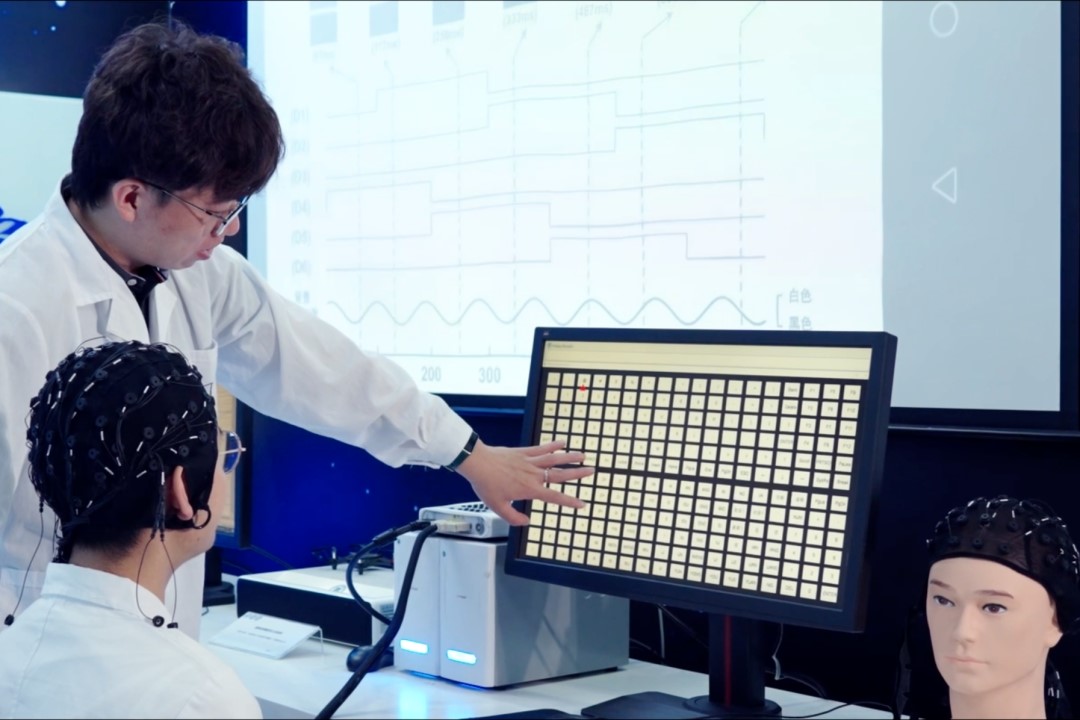China accelerates efforts to develop brain-computer interface technology
Beijing-based Xuanwu Hospital affiliated to Capital Medical University and a team at Tsinghua University successfully implanted a wireless brain-computer interface (BCI) processor into the skull of a paralyzed man during a clinical trial this January, significantly recovering his motor skills.
Thanks to the implantation, the man is now able to drink a bottle of water on his own via an air-filled glove.

A girl experiences an intelligent brain-computer interface (BCI) at the World Robot Conference 2023 in Beijing, Aug. 21, 2023. (People's Daily Online/Chen Xiaogen)
Controlling movements through brain electrical activity, allowing brain cells to "interact" with computers via tiny electrical currents...These scenarios, once found only in sci-fi novels, are gradually becoming reality with the development and application of BCI technology.
BCI is a cutting-edge technology in the field of human-computer interaction and human-machine hybrid intelligence. It is believed to have the potential to promote economic and social development and improve people's health and well-being in the future.
The medical and health sector is the primary application area for BCI. According to Luo Minmin, co-director of the Chinese Institute for Brain Research, Beijing, BCI has promising future applications, including decoding language and movement for patients with high paraplegia, treating epilepsy, depression, and even converting images into electrical signals to stimulate the visual cortex and restore some vision for people with visual impairment.
BCI integrates advanced theories and cutting-edge technologies from multiple disciplines. In recent years, the engineering and industrialization of BCI has accelerated significantly, largely due to the development of biomedical engineering, neural engineering and rehabilitation engineering, cognitive neuroscience and psychology, and artificial intelligence.
For instance, Juliano Pinto, a Brazilian who has paralysis, took the first kick of the 2014 FIFA World Cup in Brazil under the assistance of BCI. In 2016, Chinese astronauts on China's Shenzhou-11 manned spacecraft completed in-orbit verification of BCI. Multiple international teams are implementing BCI technology to assist patients in typing and speaking with their mind.
China attaches great importance to the development of BCI technology. According to the Outline of the 14th Five-Year Plan (2021–2025), in brain-like intelligence and other areas of cutting-edge technology and industrial transformation, China will organize and implement the plan for incubating and accelerating industries of the future, and plan and create a layout for such industries.

The Tianjin University neural engineering team studies brain-computer interface (BCI) technology. (Photo from the website of Tianjin University)
In recent years, China's BCI innovation ecosystem has been continuously improved, with continuous technological advancements and a growing range of product and service offerings. The industry is moving towards large-scale development.
In early 2023, the Chinese Institute for Brain Research, Beijing initiated an intelligent BCI enhancement program which aims to break through key technologies in invasive BCI and achieve initial clinical applications in three to five years. Besides, the institute has also established an entrepreneur and investment foundation and NeuCyber NeuroTech (Beijing) Company Ltd. in cooperation with other organizations.
So far, NeuCyber NeuroTech (Beijing) Company Ltd. has initiated more than 10 innovation projects in partnership with multiple Chinese universities and achieved significant progress in research and development. Li Yuan, business development director of the company, told People's Daily that one of the BCI systems developed by the company utilizes cortical electrode technology, and its key components such as flexible high-density cortical electrodes and high-performance brainwave data acquisition device have been successfully developed and gone through validation through animal experiments.
Another BCI system of the company benchmarks against internationally advanced high-throughput flexible microwire electrode technology, and is equipped with large-bandwidth high-speed neural signal acquisition devices and motor imagery decoding algorithms. With a wired version of the system, macaques can agilely intercept a two-dimensional moving cursor with their minds.
The Tianjin University neural engineering team is one of the earliest research groups in China to focus on BCI. Ming Dong, vice president of Tianjin University, told People's Daily that the university's "Shen Gong" artificial neural robot series are able to synchronize cortical and muscle activities in active rehabilitation training.
For example, the core components of "Shen Gong - Shen Jia", a neuro-regulated mechanical exoskeleton system of "Shen Gong" series, has obtained the medical device registration certificate issued by China's National Medical Products Administration, and the system's key technologies have been tested in over 1,000 clinical trials at multiple top-tier hospitals in China.
"China has made significant breakthroughs in the innovation of software, key algorithms, and typical applications in the field of BCI," Ming said. However, to expand the use of this technology, it still needs to make continuous exploration and innovation, and test the effectiveness of the technology through practice, Ming added.
Photos
Related Stories
Copyright © 2024 People's Daily Online. All Rights Reserved.









